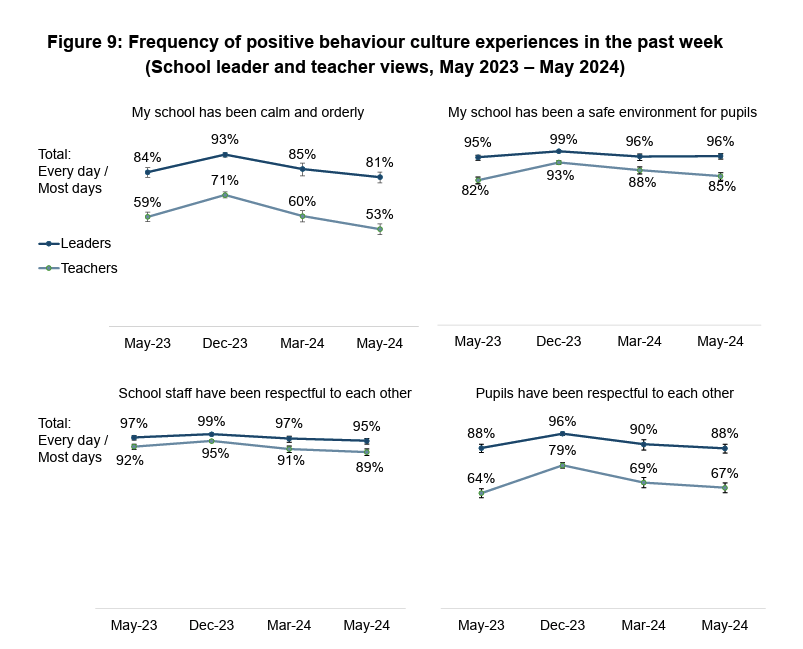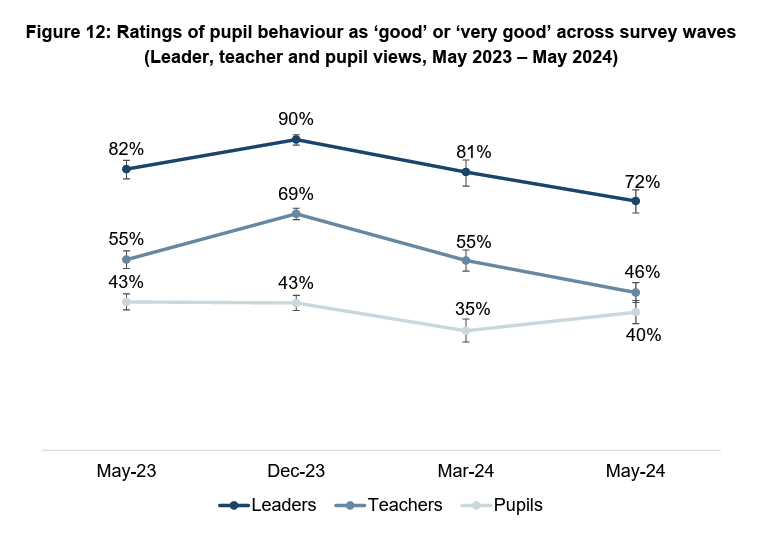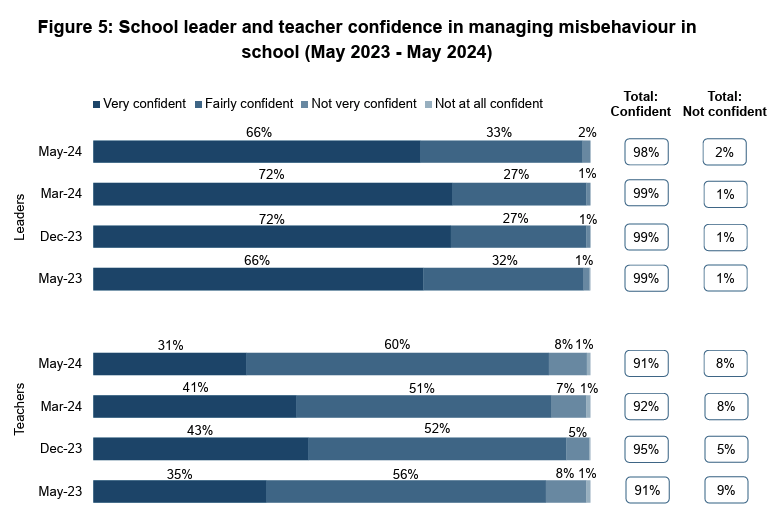Heads and teachers have reported their schools are less calm and orderly, while parents are now less likely to support school behaviour policies, according to a government survey.
The Department for Education’s latest behaviour survey report also reveals pupils feel less safe in school and are more likely to report bullying based on how they look, their race or ethnicity.
It comes after ministers announced the names of the first 21 of 90 new integrated behaviour and attendance hubs. Tom Bennett, the last government’s behaviour tsar, and former head Jayne Lowe have also been appointed ambassadors for the scheme.
Here’s what we learned…
1. Schools less calm and orderly
The report records a “statistically significant” decrease in the proportion of teachers reporting their school was calm and orderly “every day” or “most days” in the week before the survey was conducted, from 59 per cent in May 2023 to 53 per cent last year.
There were also decreases in staff reporting that pupils are respectful to each other.

The proportion of leaders and teachers reporting that pupil behaviour was either “very good” or “good” in the past week also dropped significantly, from 82 to 72 per cent among leaders and 55 to 46 per cent among teachers.

2. Fewer teachers ‘very confident’ tackling behaviour
The survey in May 2024 found the proportion of teachers reporting being “very confident” in managing misbehaviour had fallen to 31 per cent, from 35 per cent in May 2023, and 41 per cent in March 2024.
However, there was a corresponding increase in teachers feeling “fairly confident”, and overall, the proportion of teachers feeling “very” or “fairly confident” combined was 91 per cent, down on March 2024 and December 2023, but the same as in May 2023.
School leaders were “statistically more likely” than teachers to report being confident (98 per cent vs 91 per cent) or very confident (66 per cent vs 31 per cent) in managing misbehaviour.

3. Parents less supportive of rules
The proportion of parents who said they were supportive of their school’s behaviour rules has “statistically significantly decreased” from 87 per cent in June 2023, to 83 per cent in May 2024.
Parents of primary school pupils (88 per cent) were “statistically significantly” more likely than parents of secondary school pupils (77 per cent) and parents of special school pupils (80 per cent) to say they were supportive.
However, the proportion of pupils who said they were supportive remained “consistent” at 49 per cent.
4. Bullying over race and appearance increases
Pupils are now more likely to report being bullied because of they way they looked or because of their race or ethnicity.
Forty-six per cent of pupils last year reported being bullied in-person because of the way they looked, up from 40 per cent in 2023. The proportion of pupils reporting being bullied because of their race or ethnicity doubled from 5 to 10 per cent.
Online bullying for the same reasons also increased. Thirty-nine per cent reported being bullied online because of how they looked, up from 32 per cent. And the proportion reporting online bullying due to race or ethnicity more than tripled from 2 to 7 per cent.
However, there was a “statistically significant” decrease in pupils reporting being bullied online because of their sexual orientation, from 14 to 6 per cent.
5. Pupils feel less safe, but more motivated
There has been a decrease in the proportion of pupils reporting they felt safe at school every day, from 39 to 32 per cent. The report described this decrease as “statistically significant”.
But there was an uptick in the proportion of pupils reporting they felt motivated to learn, from 71 to 75 per cent.
6. But leaders more visible, and pupils report more incentives
But the report suggests leaders in schools are becoming more visible to pupils. In May 2024, 77 per cent of pupils reported seeing members of the school leadership team around the school every day or most days, up from 70 per cent the year before.
There has also been an increase in the proportion of pupils who said their school used a behavioural points system, from 72 per cent in May 2023, to 77 per cent in April 2024.
There were also increases in pupils reporting their school used certificates, prize ceremonies or special assemblies (56 to 64 per cent), verbal praise (54 to 61 per cent) and whole-class or year group rewards (23 to 28 per cent).
Pupils were also more likely to report that their school asked for feedback about behaviour (27 to 30 per cent), and more likely to be confident they’d be listened-to (40 to 44 per cent).
7. Leaders still have rosier picture of behaviour
The report shows there is a continuing divide between school leaders and teachers and pupils on how behaviour is perceived in their schools.
Fifty-six per cent of leaders said the behaviour of pupils had been “very good” or “good” in the past week, compared to 40 per cent of teachers and pupils.
Thirty-nine per cent of teachers said behaviour had been “poor” or “very poor”, compared to 18 per cent of leaders and 22 per cent of pupils.








Your thoughts